(完整版)新人教版PEP五年级英语上册复习资料(全)
人教版】五年级英语上册总复习资料(全册)
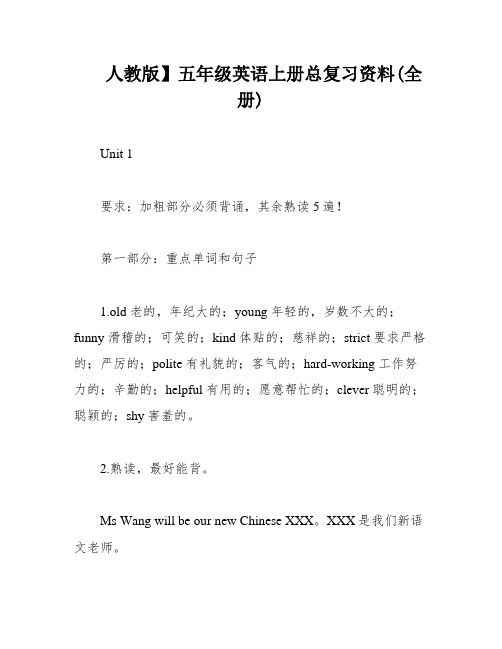
人教版】五年级英语上册总复习资料(全册)Unit 1要求:加粗部分必须背诵,其余熟读5遍!第一部分:重点单词和句子1.old 老的,年纪大的;young 年轻的,岁数不大的;funny 滑稽的;可笑的;kind 体贴的;慈祥的;strict 要求严格的;严厉的;polite 有礼貌的;客气的;hard-working 工作努力的;辛勤的;helpful 有用的;愿意帮忙的;clever 聪明的;聪颖的;shy 害羞的。
2.熟读,最好能背。
Ms Wang will be our new Chinese XXX。
XXX是我们新语文老师。
What’s she like。
她怎么样?She’s very kind。
她很和蔼。
Is she strict。
她严格吗?Yes。
sometimes。
是的,有时候。
Do you know Mr Young。
你认识XXX吗?No。
I don’t。
不,不认识。
Yes。
I do。
是的,我认识。
Who is your maths XXX。
谁是你的数学老师?Mr Li。
XXX。
XXX XXX。
他搞笑吗?Yes。
he is。
是的,他搞笑。
No。
he isn’t。
不,不搞笑。
第二部分:知识点1.Be (is。
am。
are) 的用法口诀:Be 动词 am is are;我 (I) 用 am,你 (you) 用 are;is 连着他、她、它 (he。
she。
it);我们、你们和他们 (we。
you。
they),全部都用 are。
单数 is;复数 are;he is 他是;she is 她是;it is 它是;you are 你(们)是;we are 我们是;they are 它们是;I am 我是)。
What does。
like。
是问某人或某物喜欢什么的意思。
例如:XXX。
你的父亲喜欢什么?答案可以是:XXX。
(接着喜欢的东西)。
要注意,这里的like是动词,表示喜欢。
在发音方面,我们需要注意-y[i]和-y[ai]的读音。
新人教版PEP五年级英语上册各单元知识点总结(完美版)
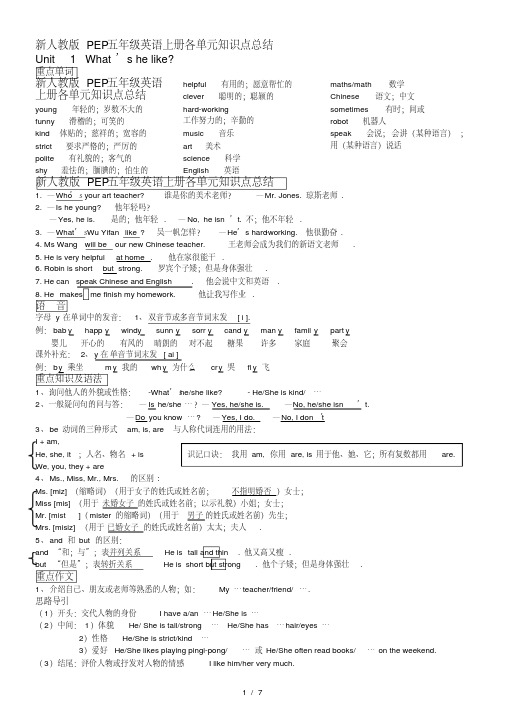
新人教版PEP五年级英语上册各单元知识点总结Unit 1 What’s he like?重点单词新人教版PEP五年级英语上册各单元知识点总结young 年轻的;岁数不大的funny 滑稽的;可笑的kind 体贴的;慈祥的;宽容的strict 要求严格的;严厉的polite 有礼貌的;客气的shy 羞怯的;腼腆的;怕生的helpful 有用的;愿意帮忙的clever 聪明的;聪颖的hard-working工作努力的;辛勤的music 音乐art 美术science 科学English 英语maths/math 数学Chinese 语文;中文sometimes 有时;间或robot 机器人speak 会说;会讲(某种语言);用(某种语言)说话新人教版PEP五年级英语上册各单元知识点总结1. —Who’s your art teacher? 谁是你的美术老师?—Mr. Jones.琼斯老师.2. —Is he young? 他年轻吗?—Yes, he is. 是的;他年轻. —No, he isn’t.不;他不年轻.3. —What’s Wu Yifan like? 吴一帆怎样?—He’s hard-working. 他很勤奋.4. Ms Wang will be our new Chinese teacher. 王老师会成为我们的新语文老师.5. He is very helpful at home. 他在家很能干.6. Robin is short but strong. 罗宾个子矮;但是身体强壮.7. He can speak Chinese and English. 他会说中文和英语.8. He makes me finish my homework. 他让我写作业.语音字母y在单词中的发音:1、双音节或多音节词末发[ i ].例:bab y happ y windy sunn y sorr y cand y man y famil y part y婴儿开心的有风的晴朗的对不起糖果许多家庭聚会课外补充:2、y在单音节词末发[ ai ]例:by 乘坐m y 我的wh y 为什么cry 哭fl y 飞重点知识及语法1、询问他人的外貌或性格:-What’s he/she like? - He/She is kind/…2、一般疑问句的问与答:—Is he/she…?—Yes, he/she is.—No, he/she isn’t.—Do you know…? —Yes, I do.—No, I don’t3、be动词的三种形式am, is, are与人称代词连用的用法:I + am,He, she, it;人名、物名+ isWe, you, they + are4、Ms., Miss, Mr., Mrs.的区别:Ms. [miz](缩略词)(用于女子的姓氏或姓名前;不指明婚否)女士;Miss [mis](用于未婚女子的姓氏或姓名前;以示礼貌)小姐;女士;Mr. [mist](mister的缩略词)(用于男子的姓氏或姓名前)先生;Mrs. [misiz](用于已婚女子的姓氏或姓名前)太太;夫人.5、and和but的区别:and “和;与”;表并列关系He is tall and thin. 他又高又瘦.but “但是”;表转折关系He is short but strong. 他个子矮;但是身体强壮.重点作文1、介绍自己、朋友或老师等熟悉的人物;如:My …teacher/friend/….思路导引(1)开头:交代人物的身份I have a/an…He/She is…(2)中间:1)体貌He/ She is tall/strong…He/She has …hair/eyes…2)性格He/She is strict/kind…3)爱好He/She likes playing pingi-pong/…或He/She often read books/… on the weekend. (3)结尾:评价人物或抒发对人物的情感I like him/her very much.识记口诀:我用am, 你用are, is用于他、她、它;所有复数都用are.2、范文:(1)课本P9 Read and write(2)My Chinese teacherI have a new Chinese teacher. She is Ms. Chen. She is tall and thin. She has big eyes and long black hair. She is kind and funny. Sometimes she is strict, too. She is hard-working. She likes reading. Her class is so much fun. We all like her.Unit 2My week重点单词新人教版PEP五年级英语上册各单元知识点总结Monday (Mon.) 周一Tuesday (Tue./Tues.) 周二Wednesday (Wed./Weds.) 周三Thursday (Thur./Thurs.) 周四Friday (Fri.) 周五Saturday (Sat.) 周六weekend 周末(周六、日)wash my clothes 洗衣服watch TV 看电视do homework 做作业read books 看书play football 踢足球on the weekend 在周末play sports/do sports 做体育运动listen to music 听音乐play ping-pong 打乒乓球新人教版PEP五年级英语上册各单元知识点总结1. —What do you have on Thursday s? 星期四你们上什么课?—I have math, English and music. 我们上数学、英语和音乐课.2. —What do you do on Thursdays, Grandpa? 爷爷;星期四你要做什么?—I have a cooking class with your grandma. 我和你奶奶去上烹饪课.3. —Do you often read books in this park? 你经常在这个公园看书吗?—Yes, I do.是的—No, I don’t.不是4. Look at my picture. 看我的图片.5. You look tired. 你看起来很累.6. You should play sports every day. 你应该每天做运动.语音字母组合ee, ea在单词中的的发音:[ i: ]例:fee t bee f m eet see fee d tea rea d ea t rep ea t脚牛肉遇见看见喂养茶阅读吃重复注:1、ee组合绝大部分发长音[ i: ];只有少部分发短音[ i ];如:coffee 咖啡2、ea字母组合除了发[ i: ];还有可能发[ e ]等发音;如:bread 面包;或者发[ ei ];如:great 好极了重点知识及语法1、询问做什么事/活动:—What do you do …? —I often play ping-pong…询问星期几上什么课:—What do you have on…? —We have English class…2、一般疑问句的问与答:—Do you often read books? —Yes, I do. —No, I don’t.3、on+具体某一天(年月日;星期);如:on Monday/Tuesday…课外at+具体时刻(…点钟);如:at 12 o’clock 在十二点整补充:in+大致时间(年月;早中晚);如:in 2014 在2014年in the morning/afternoon/evening4、play + 球类、棋类、娱乐活动;如:play football/ping-pong补充:play + the + 乐器(第四单元知识);如:play the pipa/piano/violin…重点作文1、描写一周的生活;如:My week思路导引(1)开头:简单的自我介绍:My name’s…/ I’m…(2)中间:1)介绍周一至周五的情况;可以着重介绍自己最喜欢的那一天:I go to school from Monday to Friday. I like…because I have…2)介绍自己周六、日的活动:I often watch TV/…on the weekend.(3)结尾:This is my week. What about yours?2、范文:My weekMy name is Li Ming. I go to school from Monday to Friday. I like Tuesdays and Thursdays, because I havemusic and PE. I often do my homework and read books on Saturdays. I often play ping-pong on Sundays.Unit 3What would you like? 重点单词新人教版PEP五年级英语上册各单元知识点总结hamburger 汉堡包tea 茶sandwich 三文治salad 沙拉fresh 新鲜的;刚摘的healthy 健康的delicious 美味的;可口的hot 辣的;辛辣的sweet 含糖的;甜的hungry 饿的thirsty 渴的;口渴的favourite 特别喜爱的food 食物drink 喝;饮carrot 胡萝卜chicken 鸡肉onion 洋葱milk 牛奶bread 面包beef noodles 牛肉面fish sandwich 鱼肉三明治tomato soup 西红柿汤新人教版PEP五年级英语上册各单元知识点总结1.—What would you like to eat? 你想吃什么?—A sandwich, please. 请给我一个三明治.—What would you like to drink? 你想喝什么?—I’d like some water. 我想喝点水.2. —What’s your favourite food?你最喜欢吃什么食物?—Noodles. They are delicious. 面条.面条很好吃.3. My/His /Her favourite food is fish. 我/他/她最喜欢的食物是鱼.4. I’m hungry/thirsty. 我饿/渴了.5. I don’t like beef but chicken is OK. 我不喜欢牛肉但是鸡肉也可以.6. Onions are my favourite vegetable. 洋葱是我最喜欢的蔬菜.7. I like vegetables but not carrots. 我喜欢吃蔬菜但不喜欢胡萝卜.语音字母组合ow在单词中的发音:[ au ] ;[例:[ au ] cow奶牛flow er 花wow哇dow n 向下how如何;怎样now现在[slow慢的snow雪yellow黄色window窗户snow y 下雪的tomorrow明天重点知识及语法1、询问想要吃/喝什么:—What would you like to eat/drink? —I’d like…2、询问最喜欢的事物:—What’s your favourite food/vegetable/…? —My favourite food/…is…/I like…3、名词复数的规则变化:(1)直接加s;(2)以s, x, sh, ch结尾的;加es;如;bus es box es sandwich es(3)以o结尾;有生命的加es;如;potato es tomato es无生命的加s;如;photo s piano s zoo s补充:(4)以辅音加y结尾;改y为i再加es;如;famil ies bab ies以元音加y结尾;直接加s;如;boy s day s(5)以f或fe结尾;改f为v再加es;如knife-kni ves小刀leaf-lea ves树叶4、some+可数/不可数名词例:some apple s(可数)some water/rice/juice/bread/…(不可数)课外补充:不可数名词(词后不可以加-s/es;所接动词用单数is /V-s/es)液体water milk tea orange(桔汁)coke juice气体air(空气)食物food rice bread fruit肉类meat(肉)fish beef chicken物质work(工作)paper(纸)time music weather(天气)snow money重点作文1、描述自己和家人最喜爱的食物思路导引(1)开头:简单介绍自己的家庭成员:There are…people in my family. They are…(2)中间:分别介绍每个家庭成员最喜爱的食物时什么:…favourite food is…/…is…favourite./…like(s)…best.(3)结尾:穿插说明喜欢的原因:It’s/They’re…2、范文:(1)课本P29 Read and write(2)There are four people in my family. They are my parents, my brother and me. My mother likes saladbest. It’s fresh. Beef is my father’s favourite. He thinks(认为)it’s delicious. My brother likes ice cream. It’ssweet. My favourite food is fish. It’s very healthy.Unit 4 What can you do?重点单词新人教版PEP五年级英语上册各单元知识点总结sing English songs 唱英文歌曲play the pipa 弹琵琶do kung fu 打功夫draw cartoons 画漫画swim 游泳speak English 说英语cook 烹饪;烹调play basketball 打篮球play ping-pong 打兵乓球draw pictures 画画clean the classroom 打扫课室新人教版PEP五年级英语上册各单元知识点总结1. We’ll have an English party next Tuesday! 我们下周二将举行英语派对.2. —What can you do for the party? 你能为派对做些什么呢?—I can sing English songs. 我能唱英文歌.3. How/What about you? 你呢?4. Can you do any kung fu? 你会打功夫吗?—Yes, I can. 是的;我会. —No, I can’t. 不;我不会.5. No problem. I can help you. 没问题.我会帮你.6. I can play ping-pong, but I can’t swim. 我会打乒乓球;但我不会游泳.7. Please send me an email at robin@. 请给我发邮件;邮箱robin@.语音字母组合oo在单词中的发音:[ u ];[ u: ]例:[ u ] loo k 看goo d 好的boo k 书coo k 烹饪woo d 木头foo t 脚助记口诀: 1. 看look好good书book;砍柴wood做饭cook洗脚foot.2. 押韵记忆:Look good book, cook wood foot.[ u: ] ball oo n 气球foo d 食物zoo动物园noo dles 面条注:字母组合oo发音少数发短音[ u ];多数发长音[ u: ] .重点知识及语法1、询问对方会做什么事情:—What can you do? —I can play the pipa.2、can句型的否定句:I can’t play the pipa.3、can句型的一般疑问句的问与答:—Can you do any kung fu? —Yes, I can./No, I can’t.4、play + the + 乐器;例play the erhu /pipa /piano…play + 球类、棋类、娱乐活动;例play basketball/football/ping-pong…5、some与any的异同:相同之处:都有“一些”的含义;不同之处:some+可数名词复数/不可数名词(用于肯定句中)例:I can do some kung fu. 我会打功夫.any+可数名词复数/不可数名词(用于否定句或疑问句中)例:I can’t do any kung fu. 我不会打功夫. Can you do any kung fu? 你会打功夫吗?课外补充:1)any还可以用于肯定句;作“任何的”解.例:Any student can answer this question. 任何学生都能回答这个问题.2)在表示建议;请求的疑问句中;或期望得到肯定回答时;用some而不用any.例:Would you like some coffee? 你想来点咖啡吗?重点作文1、描写自己或家庭成员会做的事情;如:I’m helpful / Super family;思路导引(1)开头:介绍自己或家庭成员的基本情况:I’m… I’m…years old.I have a super family. There are three people in my family. They are…(2)中间:介绍自己在家和在学校里会做的事情/介绍家人的外貌性格以及会做的事情:I can…at school. I can…at home.My father is strong. He can do some kung fu. My mother is…She can…(3)结尾:总结This is me. What can you do?This is my family. I love my family. Can you tell me your family?/What about your family?2、范文:(1)课本P43 Read and write(2)Hello, I’m Zhao Ming. I’m eleven years old. I’m helpful. I can clean the windows and sweep the floorat school. I can cook and wash my clothes at home.I often play the pipa on the weekend. I can play basketball. I like English very much. I can speak English well. What can you do?Unit 5重点单词新人教版PEP五年级英语上册各单元知识点总结photo 照片;相片plant 植物water bottle 水瓶bike 自行车;脚踏车in front of 在……前面beside 在旁边(附近)between 在……中间behind 在(或向)……后面above 在(或向)……上面so many 许多their 他们的lots of 许多dirty 肮脏的near 在附近house 房屋;房子;住宅新人教版PEP五年级英语上册各单元知识点总结1. Your room is really nice! 你的房间真漂亮!2. There is a big bed. 有一张床.3. 我的电脑在书桌这里.4. This is my room. 这是我的房间.5. There are so many picture s here. 这有许多照片.6. My father can draw very well. 我父亲画的很好.7 .—Where is the ball? 球在哪里?—It’s in front of the dog. 在狗的前面.8. There is a tree in front of the house. 在房子前有棵树.9. I live near the nature park. 我住在自然公园附近.语音字母组合ai, ay在单词中的发音:[ ei ]例:rai ny 下雨的rai nbow 彩虹pai nt 涂色wait 等待say说way路;方法birthd ay生日Mond ay周一day天;日子tod ay今天may可以课外补充:元音字母a在开音节中也发[ ei ] 例:cake 蛋糕face 脸name 名字重点知识及语法1、there be(is, are)句型的单复数形式:There is a clock. There are lots of flower s.课外补充:(1)There be句型的动词就近原则:例:There is a bed, a desk, two photos in my room.There are two photos, a bed and a desk in my room.(2)there be与have/has的异同:相同之处:都有“有”的含义不同之处:there be表示“某地有……”(无生命的);主语放在句末;例:There is a book on the desk. 书桌上有一本书.have/has表示“某人有……”(有生命的);放在主语(人)的后面.例:I have a book. 我有一本书.2、询问方位或地点:—Where is the ball? —It’sin front of the dog.3、lots of + 可数/不可数名词= a lot of + 可数/不可数名词“许多……”比较:many + 可数名词复数“许多……”例:There are many tree s in the forest.much + 不可数名词“许多…....”例:I drink much water every day. 我每天喝很多水. 4、动词+very well例:My father can draw very well我爸爸画的很好比较:be (am/is/are)+very good例:The book is very good. 这本书非常好.重点作文1、描写房间、卧室;如:My room / bedroom;思路导引(1)开头:总体概括自己卧室的特征I have a nice/big/clean/…room.(2)中间:描述卧室里的物品、摆设There is/are….on/beside/…… is on the desk/….(3)结尾:抒发对卧室的情感I like/love my bedroom (very much)! Can you tell me yours?2、范文:(1)课本P53 Read and write(2)My bedroomI have a nice bedroom. It’s not big but clean.I like my bedroom. Can you tell me yours?Unit 6 重点单词新人教版PEP五年级英语上册各单元知识点总结hill 山丘;小山river 河;江mountain 高山;山岳lake 湖;湖泊village 村庄;村镇house 房屋;房子;住宅tree 树;树木;乔木bridge 桥go boating 去划船nature park 自然公园people 人;人们rabbit 兔子duck 鸭子animal 动物high 高的children 孩子们(child的复数形式)新人教版PEP五年级英语上册各单元知识点总结1. Children, let’s go to the forest. 孩子们;让我们去森林吧.2. —Is there a river in the forest? 森林里有河流吗?—Yes, there is.是;有的. —No, there isn’t.不;没有.3. The nature park is so quiet! 自然公园这么安静!4. There aren’t many people. (这里)人不多.5. —Are there any tall building s in the nature park? 自然公园例有高楼吗?—Yes, there are.是;有的. —No, there aren’t.不;没有.6. —How many? 多少? —Two. 两个.7. Robin is at Mr. Jones’ house. 罗宾在琼斯先生的房子里.语音字母组合ou在单词中的发音:[ au ]例:hou se 房屋;房子mou se 老鼠sou nd 声音;听起来cou nt 数数提示:字母组合ow也有些发[ au ];例:cow奶牛how如何;怎样dow n 向下课外补充:字母组合ou在单词中还可读[ u: ];如sou p 汤grou p 群;团体;和[ ;如you ng 年轻的.重点知识及语法1、there be句型的一般疑问句的问与答:—Is there a lake? —Yes, there is. —No, there isn’t.—Are there any animal s? —Yes, there are. —No, there aren’t. 2、there be(is, are)句型的单复数形式(具体见Unit 5的重点知识及语法):例:There is a nature park near the house. There are many duck s on the lake.3、some与any在肯定句、否定句及问句中的用法:some+可数名词复数/不可数名词(用于肯定句中)例:There are some books on the desk.any+可数名词复数/不可数名词(用于否定句或疑问句中)例:There aren’t any people in the forest.Are there any tall buildings in the natures park?4、people人;人们(集体名词;明为单数;实为复数;词末不能加-s)例:There are many people in the park.重点作文1、描写景物;如:看图作文(风景图)思路导引(1)开头:Look at the picture.(2)中间:用There is/are…beside/in front of…句型描述图中所有的景物及其位置;注意要有明确的观察主线;即观察的顺序性与条理性.2、范文:(1)课本P63 Read and write(2)看图作文Look at the picture. This is a beautiful village. There are three houses in thepicture. There are many trees near them. In front of the houses, there is a river.The bridge is over the river. Behind the houses, there is a forest and a mountain.。
期末复习(课件)人教PEP版英语五年级上册

语法
可数名词变复数 有规律的变法 1、一般在词尾加s 2、以s、x、sh、ch结尾的,加es 3、以辅音字母加y结尾的,把y变成i再加es
以元音字母加y结尾的,直接加s 4、以o结尾的,有生命的加es: tomato、potato、hero(英雄爱吃土豆和西红柿)
没有生命的加s 5、以f/fe结尾的,把f/fe变成v,再加es
4、Practice makes perfect. 熟能生巧。
5、East,west,home is best. 金窝银窝,不如自己的狗窝。
6、Seeing is believing. 眼见为实。
形容词
tired 疲倦的 thirsty 口渴的 favourite 特别喜爱的 dirty 脏的 high 高的 wonderful 极好的 next 下一个 Dear 亲爱的
动词
know 知道,了解 finish 完成 learn 学习 send 邮寄 move 搬家 live 居住 speak 说 want 想要 drink 喝
4、询问对方会做什么事并回答 What can you do? I can... 询问对方能否做某事并回答 Can you...? Yes,I can./No,I can’t.
5、描述某处有某物 There is a/an+可数名词的单数+其他. There is+不可数名词+其他. There are+可数名词的复数+其他.
6、询问某处是否有某物并回答 Is there a/an...? Yes,there is./No,there isn’t. Are there...? Yes,there are./No,there aren’t.
PEP英语五年级上册复习资料.doc
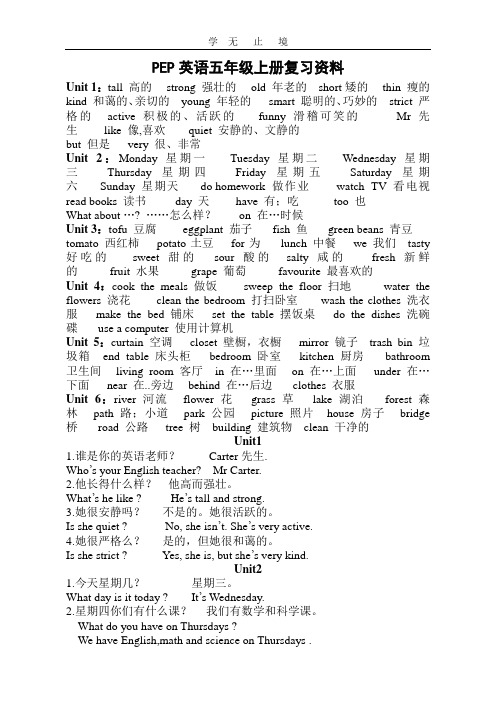
PEP英语五年级上册复习资料Unit 1:tall 高的 strong 强壮的 old 年老的short矮的thin 瘦的kind 和蔼的、亲切的young 年轻的 smart 聪明的、巧妙的 strict 严格的active 积极的、活跃的funny滑稽可笑的 Mr 先生like 像,喜欢quiet 安静的、文静的but 但是very 很、非常Unit 2:Monday 星期一Tuesday 星期二Wednesday 星期三Thursday 星期四Friday 星期五Saturday 星期六Sunday 星期天 do homework 做作业watch TV 看电视read books 读书day 天have 有;吃too 也What about …? ……怎么样?on 在…时候Unit 3:tofu 豆腐eggplant 茄子fish 鱼green beans 青豆tomato 西红柿potato土豆for为lunch 中餐we 我们tasty 好吃的sweet 甜的sour 酸的 salty 咸的fresh 新鲜的 fruit 水果grape 葡萄favourite 最喜欢的Unit 4:cook the meals 做饭sweep the floor 扫地water the flowers 浇花clean the bedroom 打扫卧室wash the clothes 洗衣服make the bed 铺床set the table 摆饭桌do the dishes洗碗碟use a computer 使用计算机Unit 5:curtain 空调closet 壁橱,衣橱mirror 镜子trash bin 垃圾箱end table 床头柜bedroom 卧室kitchen 厨房bathroom 卫生间 living room 客厅in 在…里面on 在…上面under 在…下面near 在..旁边behind 在…后边clothes 衣服Unit 6:river 河流flower 花 grass 草lake 湖泊 forest 森林 path 路;小道park 公园picture 照片house 房子 bridge 桥 road 公路 tree 树building 建筑物clean 干净的Unit11.谁是你的英语老师?Carter先生.Who’s your English teacher? Mr Carter.2.他长得什么样?他高而强壮。
新人教版PEP小学英语五年级上册全册知识点复习PPT课件

• 第五六单元 1.There be句型包括 There is a …后面跟名词单数,表示一个。例 如:There is a mirror on the wall. There are some/many…后面 跟名词复数,表示多个。例如: There are two end tables near the bed. 2. on与over的区别 on: 在。。。上面,表示与下面的物体相互接触,紧挨着。 over: 在。。。上面,表示与下面的物体没有接触,悬空着。 3. 以系动词(am, is, are)和助动词(can, do)等开头的句子叫做 一般疑问句。 如: Is your sister a teacher? Yes, she is. / No, she isn’t. Are you a student? Yes, I am. / No, I’m not. Do you have new teachers? Yes, we do. / No, we don’t. Does Amy have new teachers? Yes, she does./ No, she doesn’t. Can you wash the clothes? Yes, I can. / No, I can’t.
• 5 今天星期几?星期二。 What day is it today ? It’s Tuesday. • 6 星期二你们有什么课? What do you have on Tuesdays ? • 7 我们有数学和科学课。 We have math and science. • 8 星期六你常常干些什么? What do you do on Saturdays ? • 9 我看电视做作业。 I watch TV and do homework. • 10 你怎么样? 我也做作业。 What about you ? I do my homework, too.
新人教版PEP五年级英语上册复习全资料(全)
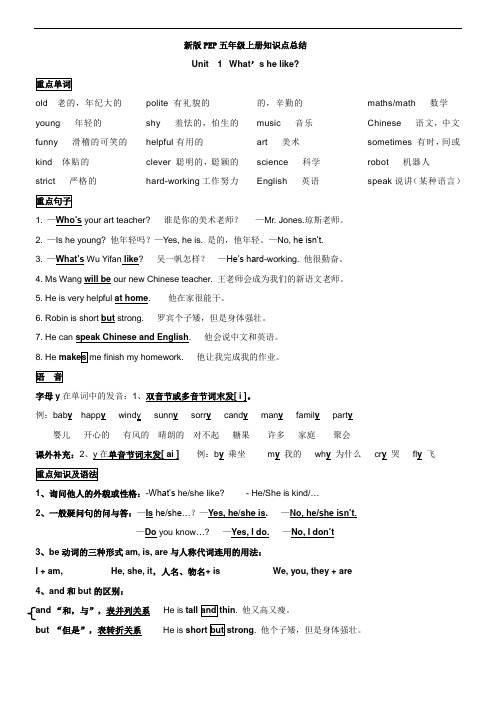
新版PEP 五年级上册知识点总结Unit 1 What ’s he like?old 老的,年纪大的young 年轻的funny 滑稽的可笑的kind 体贴的strict 严格的polite 有礼貌的 shy 羞怯的,怕生的 helpful 有用的 clever 聪明的,聪颖的 hard-working 工作努力的,辛勤的 music 音乐 art 美术 science 科学 English 英语 maths/math 数学 Chinese 语文,中文 sometimes 有时,间或 robot 机器人 speak 说讲(某种语言)1. —Who’s your art teacher? 谁是你的美术老师? —Mr. Jones.琼斯老师。
2. —Is he young? 他年轻吗?—Yes, he is. 是的,他年轻。
—No, he isn’t.3. —What’s Wu Yifan like ? 吴一帆怎样? —He’s hard -working. 他很勤奋。
4. Ms Wang will be our new Chinese teacher. 王老师会成为我们的新语文老师。
5. He is very helpful at home . 他在家很能干。
6. Robin is short but strong. 罗宾个子矮,但是身体强壮。
7. He can speak Chinese and English . 他会说中文和英语。
8. He他让我完成我的作业。
字母y 在单词中的发音:1、双音节或多音节词末发[ i ]。
例:bab y happ y windy sunn y sorr y cand y man y famil y part y婴儿 开心的 有风的 晴朗的 对不起 糖果 许多 家庭 聚会课外补充:2、y 在单音节词末发[ ai ] 例:b y 乘坐 m y 我的 wh y 为什么 cr y 哭 fl y 飞1、询问他人的外貌或性格:-What’s he/she like? - He/She is kind/…2、一般疑问句的问与答:—Is he/she…?—Yes, he/she is. —No, he/she isn’t.—Do you know …? —Yes, I do. —No, I don ’t3、be 动词的三种形式am, is, are 与人称代词连用的用法:I + am, He, she, it ,人名、物名+ is We, you, they + are 4、and 和but 的区别:and “和,与”,表并列关系 He is . 他又高又瘦。
人教PEP版英语【完美】五年级上册单元知识梳理-全册书含答案
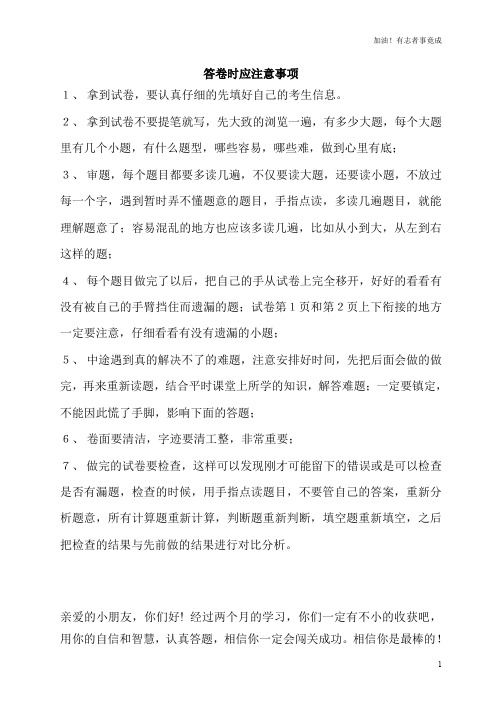
加油!有志者事竟成答卷时应注意事项1、拿到试卷,要认真仔细的先填好自己的考生信息。
2、拿到试卷不要提笔就写,先大致的浏览一遍,有多少大题,每个大题里有几个小题,有什么题型,哪些容易,哪些难,做到心里有底;3、审题,每个题目都要多读几遍,不仅要读大题,还要读小题,不放过每一个字,遇到暂时弄不懂题意的题目,手指点读,多读几遍题目,就能理解题意了;容易混乱的地方也应该多读几遍,比如从小到大,从左到右这样的题;4、每个题目做完了以后,把自己的手从试卷上完全移开,好好的看看有没有被自己的手臂挡住而遗漏的题;试卷第1页和第2页上下衔接的地方一定要注意,仔细看看有没有遗漏的小题;5、中途遇到真的解决不了的难题,注意安排好时间,先把后面会做的做完,再来重新读题,结合平时课堂上所学的知识,解答难题;一定要镇定,不能因此慌了手脚,影响下面的答题;6、卷面要清洁,字迹要清工整,非常重要;7、做完的试卷要检查,这样可以发现刚才可能留下的错误或是可以检查是否有漏题,检查的时候,用手指点读题目,不要管自己的答案,重新分析题意,所有计算题重新计算,判断题重新判断,填空题重新填空,之后把检查的结果与先前做的结果进行对比分析。
亲爱的小朋友,你们好! 经过两个月的学习,你们一定有不小的收获吧,用你的自信和智慧,认真答题,相信你一定会闯关成功。
相信你是最棒的!1五年级上册知识清单一、语音(一)字母y的发音规律⑴字母y在单词中处于非重读音节的词尾时,常发/i/。
例词:many许多的, windy有风的, sunny晴朗的, baby婴儿, sorry对不起, family家庭, party聚会⑵字母y在单词中的位置不同,发音不一样。
用法例词当字母y在单词开头时常发/j/yes是;是的young年轻的字母y在单词中处于重读音节的词尾时,发/aɪ/。
by乘,my我的,fly 放, July七月当字母y在单词末尾时,分两种情况。
字母y在单词中处于非重读音节的词尾时,常发/i/。
2019新人教版PEP五年级英语上册复习资料(全)

1新版PEP五年级上册知识点总结Unit 1 What’s he like?old 老的,年纪大的young 年轻的funny 滑稽的可笑的kind 体贴的strict 严格的polite 有礼貌的shy 羞怯的,怕生的helpful有用的clever 聪明的,聪颖的hard-working工作努力的,辛勤的music 音乐art 美术science 科学English 英语maths/math 数学Chinese 语文,中文sometimes 有时,间或robot 机器人speak说讲(某种语言)1. —Who’s your art teacher? 谁是你的美术老师?—Mr. Jones.琼斯老师。
2. —Is he young? 他年轻吗?—Yes, he is. 是的,他年轻。
—No, he isn’t.3. —What’s Wu Yifan like? 吴一帆怎样?—He’s hard-working. 他很勤奋。
4. Ms Wang will be our new Chinese teacher. 王老师会成为我们的新语文老师。
5. He is very helpful at home. 他在家很能干。
6. Robin is short but strong. 罗宾个子矮,但是身体强壮。
7. He can speak Chinese and English. 他会说中文和英语。
8. He他让我完成我的作业。
字母y在单词中的发音:1、双音节或多音节词末发[ i ]。
例:bab y happ y windy sunn y sorr y cand y man y famil y part y 婴儿开心的有风的晴朗的对不起糖果许多家庭聚会课外补充:2、y在单音节词末发[ ai ] 例:b y 乘坐m y 我的wh y 为什么cr y 哭fly 飞1、询问他人的外貌或性格:-What’s he/she like? - He/She is kind/…2、一般疑问句的问与答:—Is he/she…?—Yes, he/she is.—No, he/she isn’t.—Do you know…? —Yes, I do.—No, I don’t3、be动词的三种形式am, is, are与人称代词连用的用法:第一人称单数I + am, I am a student.第三人称单数He, she, it,人名、物名+ is He is friendly . She is tall and thin. it is fat .Mike is a student.第一人称复数We,第二人称单复数you,第三人称复数they + areWe are family. You are my friend. They are my grandparents.4、and和but的区别:and “和,与”,表并列关系 He is . 他又高又瘦。
2020新人教版PEP五年级英语上册复习资料(全)
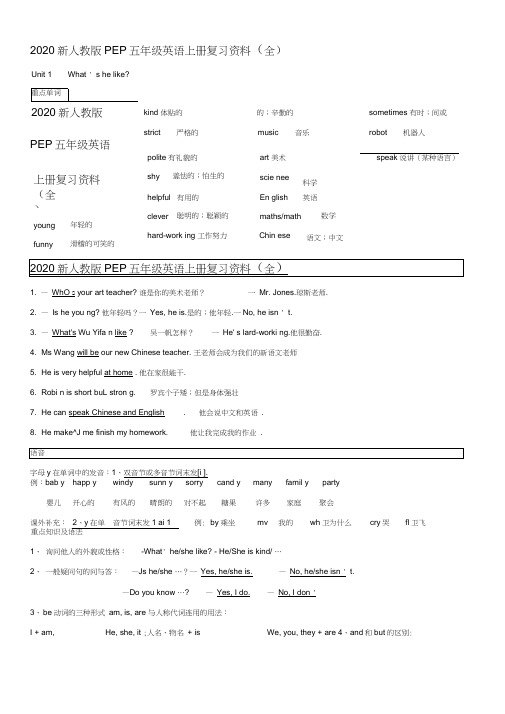
2020新人教版PEP 五年级英语上册复习资料(全)上册复习资料 polite 有礼貌的art 美术 scie nee 科学speak 说讲(某种语言)shy羞怯的;怕生的(全)helpful 有用的 En glish英语clever 聪明的;聪颖的maths/math数学young年轻的funny滑稽的可笑的hard-work ing 工作努力 Chin ese语文;中文1. — WhO s your art teacher? 谁是你的美术老师?一 Mr. Jones.琼斯老师.2. — Is he you ng? 他年轻吗?一 Yes, he is.是的;他年轻.一No, he isn ' t.3. — What's Wu Yifa n like ?吴一帆怎样?一 He' s lard-worki ng.他很勤奋.4. Ms Wang will be our new Chinese teacher. 王老师会成为我们的新语文老师5. He is very helpful at home . 他在家很能干.6. Robi n is short buL stron g.罗宾个子矮;但是身体强壮7. He can speak Chinese and English . 他会说中文和英语 . 8. He make^J me finish my homework.他让我完成我的作业 .字母y 在单词中的发音:1、双音节或多音节词末发[i ]. 例:bab y happ y windy sunn y sorry cand ymanyfamil yparty婴儿开心的有风的晴朗的对不起糖果许多家庭 聚会课外补充: 2、y 在单 音节词末发1 ai 1 例: by 乘坐mv我的wh 卫为什么 cry 哭 fl 卫飞重点知识及语法1、 询问他人的外貌或性格: -What ' he/she like? - He/She is kind/ …2、 一般疑问句的问与答:—Js he/she …?一 Yes, he/she is.— No, he/she isn ' t. —Do you know …?— Yes, I do.— No, I don '3、 be 动词的三种形式 am, is, are 与人称代词连用的用法: I + am,He, she, it ;人名、物名 + isWe, you, they + are 4、and 和but 的区别:fand“和;与”;表并列关系 He is tall and thin . 他又咼又瘦.but“但是”;表转折关系He is shortstr ong.他个子矮;但是身体强壮Un it 2 My week1. — What do you ha 、vg _on Thursday 甘? 星期四你们上什么课?—I have math, En glish and music.我们上数学、英语和音乐课2. — What do you do_ on Thursdays, Gran dpa?爷爷;星期四你要做什么? —I have a cooking classwith your grandma.我和你奶奶去上烹饪课3. — Do vou ofte n read books in this park?你经常在这个公园看书吗?—Yes, I do. 是的 一No, I don ' t 不是4. Look at my picture.看我的图片5. You look tired . 你看起来很累6. You should play sports every day.你应该每天做运动 .语 音 字母组合ee, ea 在单词中的的发音:[i:]例:feetbeef meet seefeed tea readeatrepeat脚牛肉遇见看见喂养茶阅读吃重复注:1、ee 组合绝大部分发长音[i: 1 :只有 少部分发短音[i 1 ;如:coffee 咖啡2、ea 字母组合除了发[i:]:还有可能发[e ]等发音;如:bread 面包;或者发[ei ]:如:great 好极了 重点知识及语厂1、 「询问做什么事 /活动:一What do you do …?— I often play ping-pong …询问星期几上什么课: 一What do you have on …?— We have English class …2、 一般疑问句的问与答: 一Do you often read books? — Yes, I do .— No, I don ' t.2020新人教版PEP 五年级 英语上册复习资料(全)Monday (Mo n.)周一Tuesday(Tue./Tues.)周二 Wedn esday(Wed./Weds.) 周三Thursday (Thur./Thurs.) 周四Friday (Fri.) 周五Saturday (Sat.) 周六 weeke nd周末wash my clothes 洗衣服 watch TV 看电视 dohomework 做作业 play football 踢足球 on the weeke nd 在周末 play sports/do sports 做体育运动liste n to music 听音乐 play pin g-p ong打乒乓球read books 看书3、{bn+ 具体某一天(年月日;星期):如: on Monday/Tuesday课外 at+具体时刻(…点钟);如:at 12 o 'lock 在十二点整 补充: 时大致时间(年月;早中晚) ;如:in 2014 在2014年4、play + 球类、棋类、娱乐活动 ;如: play football/ping-pong补充:play + the + 乐器(第四单元知识);如:Unit 3What would you like?1. — What would you like to |eat ? 你想吃什么? 一A sandwich, please.请给我一个三明治2. — What ' s your favourite food?3. My/His /Her favourite food is fish.5. I don ' t like beebut chicken is OK.6. Onions are my favourite vegetable.7. I like vegetables but not carrots. 4. I ' mungry/thirsty . 我饿 /渴了 .字母组合ow 在单词中的发音:[au ]1、询问想要吃 / 喝什么:一 What would you like to eat/dri nk? — I 'like …2、 询问最喜欢的事物:一 What 'your favourite food/vegetable/3、 名词复数的规则变化:(2)以 s, x, sh, ch 结尾的;力口 es ;女口;buses boxes sandwich es(3)以 o 结尾;有生命的加 es ;女口; potato es tomato es :无生命的加 s ;女口; photo.spianoszoos—What would you like to drink 你想喝什么? —I ' d likesome water.我想喝点水in the morni ng/afterno on/eve ningplay the pipa/pia no/violi n2020新人教版 PEP 五年级英语 上册复习资料 (全)hamburger 汉堡包 tea 茶 salad 沙拉favourit eJ特别喜爱的beef no odles 牛肉面 fresh 新鲜的 food 食物 fish sandwich鱼肉healthy健康的drink 喝;饮 三明治delicious 美味的; carrot 胡萝卜tomato soup西红柿汤hot 辣的;辛辣的 chicke n鸡肉sweet 含糖的;甜的 onion 洋葱hungry 饿的 milk 牛奶thirsty 渴的;口渴的bread面包你最喜欢吃什么食物?一 Noodles. They are delicious. 面条.面条很好吃我/他 /她最喜欢的食物是鱼. 我不喜欢牛肉但是鸡肉也可以 洋葱是我最喜欢的蔬菜.我喜欢吃蔬菜但不喜欢胡萝卜例:[au ]cow 奶牛 flow er 花 wow 哇 dow n 向下 how 如何;怎样 now 现在 slow 慢的 snow 雪yellow 黄色window.窗户snowy 下雪的 tomorrow 明天—My favourite food/ …is …/I like …(1)直接加s ;(4)以辅音加y 结尾;改y 为i 再加es ;女口; famil ies babies ;以元音加y 结尾;直接加s ;如;boy s day s (5 )以f 或fe 结尾;改f 为v 再加es ;女口 knife-kni ves 小刀 leaf-lea ves 树叶4、some+ 可数 /不可数名词 例:some apple s (可数) some water/rice/juice/bread/ …(不可数)课外补充:不可数名词(词后不可以加 -s/es ;所接动词用单数 is /V-s/es )液体 water milk tea orange (桔汁) coke juice气体 air (空气)1. We ' have an English party next Tuesday!我们下周二将举行英语派对.2. — What can you do for. the party?你能为派对做些什么呢? 一I can sing English songs. 我能唱英文歌.3. How/What about you? 你呢?4. Can you do any kung fu? 你会打功夫吗一Yes, I can. 是的;我会. 一No, I can '.5. No problem . I can help you.没问题.我会帮你.6. I can play ping-pong, but I can 'swim.我会打乒乓球; 但我不会游泳 .7. Please send me an email at robin@. 请给我发由E 件;由E 箱 robin@.语 音字母组合oo 在单词中的发音:[u ] ; [ u:]例:[u ] look 看 good 好的 book 书 cook 烹饪 wood 木头 foot 脚助记口诀:1.看look 好good 书book ;砍柴wood 做饭cook 洗脚foot.2. 押韵记忆: Look good book, cook wood foot.[u: ] balloo n 气球 food 食物 zoo 动物园 noodies 面条注:字母组合oo 发音少数发短音[u ];多数发长音[u:].食物 food rice bread fruitpaper (纸)time music2020新人教版PEP 五年级 英语上册复习资料(全)sing English songs 唱英文歌 play the pipa 弹琵琶 do kung fu肉类 meat (肉)fish beefweather (天气)rain snowUnit 4 What ca n you do?draw carto ons 画漫画 swim 游泳 speak En glish说英语cook 烹饪;烹调 play basketball 打篮球chi cke nmoneyplay pin g-p ong 打兵乓球 draw pictures 画画clean the classroom 打扫教室1、 询问对方会做什么事情:一What ca n you do? — lean play the pipa.2、 can 句型的否定句 :I can ' play the pipa.3、 can 句型的一般疑问句的问与答:一Can you do any kung fu? — Yes, I can./No, I can '4、 、play + the + 乐器; 例 play the erhu /pipa /piano …play + 球类、棋类、娱乐活动;例 play basketball/football/ping-pong … 5、 some 与 any 的异同:不同之处:some+可数名词复数/不可数名词(用于肯定句中) 例:I can do some kung fu. 我会打功夫:any+可数名词复数/不可数名词(用于否定句或疑问句中)例:I can ' do any kung fu. 我不会练武术.Can you do any kung fu?你会练武术吗?Un it 51. Your room is really nice !你的房间真漂亮!2. There is a big bed.有一张床.3. 我的电脑在书桌这里.4. This is my room.这是我的房间.5. There are so many picture here.这有许多照片.6. My father can draw very well .我父亲画的很好.7 . — Where is the ball? 球在哪里? 一 It s in fron t of the dog. 在狗的前面. 8. There is a tree in front of the house. 在房子前有棵树 .9. I live near the nature park. 我住在自然公园附近.语 音|字母组合ai, ay 在单词中的发音:[ei ]例:rainy 下雨的 rainbow 彩虹pal nt 涂色 wait 等待 say 说 way 路;方法birthday 生日 Monday 周一 day 天;日子 today 今天 may 可以photo 照片;相片beside 在旁边(附近) their 他们的 pla nt植物betwee n在 ……中间lots of 许多 water bottle 水瓶beh ind 在… •…后面 dirty 肮脏的 bike自行车; 脚踏车above 在… …上面n ear在附近in front of 在…、> -—7~*■•…刖面so many许多house 房屋2020新人教版 PEP 五年级英语 上册复习资料 (全)1、there be (is, are ) 句型的单复数形式:There is a clock. There are lots of flower 詁.(1) There be 句型的动词就近原则:例: There is |a bed|, a desk, two photos in my room.There are two photoT^, a bed and a desk in my room.2、 询问方位或地点:一 Where is the ball? — It ' insfront of the dog.3、 lots of + 可数/不可数名词 =a lot of + 可数/不可数名词“许多 .. ”比较: many + 可数名词复数 “许多 ...... ” 例:There are many tree® in the forest.much + 不可数名词“许多…....”例:I drink much water every day. 我每天喝很多水4、动词 +very well 例:My father can draw very well 我爸爸画的很好比较:be (am/is/are)+very good例: The book is very good .这本书非常好.Unit 62020新人教版PEP 五年级英语上册复习资料(全)2. —Is there a river in the forest?森林里有河流吗?—Yes, there is. 是; 有的. —No, there isn '.3. The nature park is so quiet ! 自然公园这么安静!4. There aren ' many people .没有许多人.5. — Are there kny I tall building Q in the nature park?自然公园例有高楼吗? —Yes, there are. 是; 有的.—No, there aren '.不; 没有.6. — How ma ny? 多少? 一 Two.两个.7. Robin is at Mr. Jones 'house. 罗宾在琼斯先生的房子里. 语 音|字母组合ou 在单词中的发音:[au ]2020新人教版PEP 五年级 英语上册复习资料(全)hill 山丘;小山 river 河;江mou ntai n 高山;山岳 lake 湖;湖泊 village 村house 房屋;房子;住宅 tree 树;树木;乔木 bridge 桥go boati ng 去戈修占 nature park 自然公园 people 人;人们 rabbit 兔子duck 鸭子 an imal 动物 high 高的 childre n孩子们(child 的复数形例:house房屋;房子mouse老鼠sou nd 声音;听起来cou nt 数数提示:字母组合ow也有些发[au ];例:cow奶牛how 如何;怎样dow n向下重点知识及语法there be句型的一般疑问句的问与答:—Is there a lake? —Yes, there is. —No, there isn '.—Are there any animals? —Yes, there are. —No, there aren '2> there be (is, are )句型的单复数形式(具体见Unit 5的重点知识及语法):例: There is a nature park near the house. There are many duck 冋on the lake.3、some与any在肯定句、否定句及问句中的用法:{some+可数名词复数/不可数名词(用于肯定句中)例:There are $ome | books on the desk. 、any+可数名词复数/不可数名词(用于否定句或疑问句中)例: There aren '如丫people in the forest.Are there ahy tall build ings in the n atures park?4、people 人;人们(集体名词;明为单数;实为复数;词末不能加-s)例:There are many peoplein the park.。
全册(知识清单)-2024-2025学年人教PEP版英语五年级上册
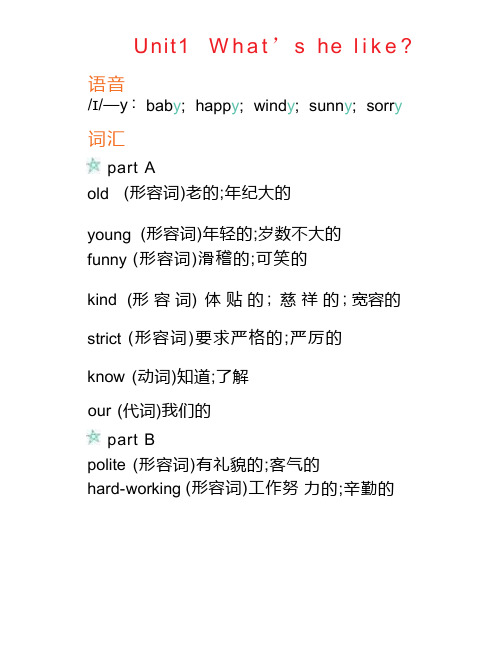
Unit1 W h a t’s he l i k e?语音/ɪ/—y : bab y; happ y; wind y; sunn y; sorr y 词汇part Aold (形容词)老的;年纪大的young(形容词)年轻的;岁数不大的funny (形容词)滑稽的;可笑的kind (形容词) 体贴的; 慈祥的; 宽容的strict (形容词)要求严格的;严厉的know (动词)知道;了解our (代词)我们的part Bpolite (形容词)有礼貌的;客气的hard-working (形容词)工作努力的;辛勤的helpful (形容词) 有用的; 愿意帮忙的clever(形容词)聪明的;聪颖的shy(形容词)羞怯的;腼腆的;怕生的Ms (缩略词)(用于女子的姓氏或姓名前’不指明婚否)女士will (情态动词)(谈及将来)将要sometimes (副词)有时;间或robot (名词)机器人him (代词)(用作宾语或表语)他speak (动词)会说;会讲(某种语言) ; 用(某种语言)说话finish (动词)完成;做好短语head teacher校长a good football player一名优秀的足球运动员short but strong个子矮但是很强壮finish my homework完成我的作业句子part A1.—Is he y oung? 他年轻吗?—No,he isn’t. 不,他不年轻。
2. He’s old. 他是年老的。
3. —W ho’s your English teacher?你的英语老师是谁?—Miss W hite. 怀特小姐。
part B—W hat’s she like? 她什么样? —S he’s kind. 她很和蔼。
Unit2 My w eek 语音/i:/—ee : f ee t; b ee f; m ee t/i:/—ea : t ea; r ea d; ea t词汇part AMonday (名词)星期一Tuesday (名词)星期二Wednesday (名词)星期三Thursday (名词)星期四Friday(名词)星期五Saturday (名词)星期六Sunday(名词)星期日weekend (名词)周末cooking (名词)烹饪;烹调part Bwash (动词)洗wash my clothes洗我的衣服watch (动词)看watch TV看电视do (动词)做;干do homework做作业read (动词)看;读read books看书play (动词)踢;玩;参加(体育运动) play football 踢足球often (副词)时常;常常park (名词)公园tired(形容词)疲倦的sport (名词)体育运动play sports 做体育运动should (情态动词)(常用于纠正别人)应该;应当every (形容词)每一个’每个day (名词)一天;一日schedule (名词)工作计划; 日程安排短语活动类wash my clothes 洗我的衣服watch TV看电视read books 看书play football 踢足球do homework做作业play ping-pong 打乒乓球listen to music 听音乐play sports 做体育运动其他a cooking class 一节烹饪课on the weekend在周末on Mondays/Tuesdays. . . 在星期一/星期二……句子part A—What do you have on Thursdays?星期四你有什么课?—I have maths ,English and music. 我有数学、英语和音乐课。
人教版PEP小学英语五年级上册知识复习要点

人教版PEP小学英语五年级上册知识复习要点在小学五年级上册的英语教学中,学生将继续学习更多有关基础英语的知识和技能。
这个年级的学习重点包括拼读、词汇、语法和句子构造等方面。
下面将总结人教版PEP小学英语五年级上册的知识复习要点,帮助学生复习和巩固所学内容。
一、拼读1. 复习26个英文字母的发音和拼写。
2. 复习元音字母及其发音,如 a, e, i, o, u。
3. 复习辅音字母及其发音,如 b, c, d, f 等。
4. 复习发音规则,如字母组合 ch, sh, th, wh 的发音。
二、词汇1. 复习学过的动物名称,如 dog, cat, lion 等。
2. 复习学过的食物名称,如 apple, banana, cake 等。
3. 复习学过的家庭成员名称,如 father, mother, sister 等。
4. 复习学过的身体部位名称,如 head, arm, leg 等。
5. 复习学过的颜色名称,如 red, blue, yellow 等。
三、语法1. 复习句子的基本结构,即主语+谓语的形式。
2. 复习肯定句和否定句的构造,如 I like apples. / I don't like apples.3. 复习一般疑问句的构造,如 Do you like apples? / Does he like apples?4. 复习选择疑问句的构造,如 Is it a cat or a dog?5. 复习形容词的基本用法,如 tall, short, big 等。
四、句子构造1. 复习构造简单的陈述句,如 I have a book.2. 复习构造简单的祈使句,如 Open the door.3. 复习构造简单的感叹句,如 What a beautiful flower!4. 复习使用正确的句型构造对话,如 A: What's your name? B: My name is Tom.五、其他1. 复习数字的表达和认读,如1-100的数字。
2017新人教版PEP五年级英语上册复习资料(全)

2017新人教版PEP五年级英语上册复习资料(全)New n Summary of Knowledge Points for PEP Grade 5 Unit 1: What's He Like?Key Vocabulary:Old: having lived for a long time。
advanced in yearsYoung: being in an early stage of life。
growth。
or developmentFunny: causing laughter or amusement。
humorousKind: having a friendly。
generous。
or considerate natureStrict: demanding that rules concerning r are obeyed and observedKey Sentences:1."Who's your art teacher?" - "Mr。
Jones."2."Is he young?" - "Yes。
he is." / "No。
he isn't."3."What's Wu Yifan like?" - "He's hard-working."4."Ms。
Wang will be our new Chinese teacher."5."He is very helpful at home."6."Robin is short but strong."7."He can speak Chinese and English."8."He makes me finish my homework."n:The letter "y" at the end of polysyllabic words is pronouncedas [i]。
2020新人教版PEP五年级英语上册复习资料(全)(1)
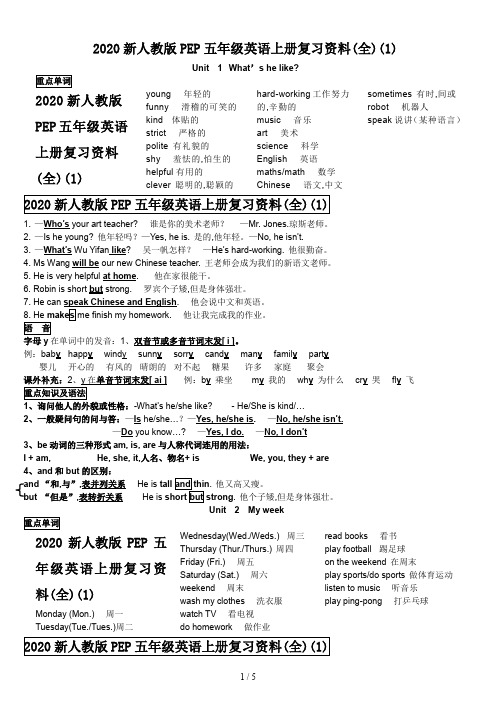
2020新人教版PEP 五年级英语上册复习资料(全)(1)Unit 1 What ’s he like?2020新人教版PEP 五年级英语上册复习资料(全)(1) young 年轻的 funny 滑稽的可笑的 kind 体贴的 strict 严格的 polite 有礼貌的 shy 羞怯的,怕生的 helpful 有用的clever 聪明的,聪颖的 hard-working 工作努力的,辛勤的 music 音乐 art 美术 science 科学 English 英语maths/math 数学 Chinese 语文,中文 sometimes 有时,间或 robot 机器人 speak 说讲(某种语言)1. —Who’s your art teacher? 谁是你的美术老师? —Mr. Jones.琼斯老师。
2. —Is he young? 他年轻吗?—Yes, he is. 是的,他年轻。
—No, he isn’t.3. —What’s Wu Yifan like ? 吴一帆怎样? —He’s hard -working. 他很勤奋。
4. Ms Wang will be our new Chinese teacher. 王老师会成为我们的新语文老师。
5. He is very helpful at home . 他在家很能干。
6. Robin is short but strong. 罗宾个子矮,但是身体强壮。
他会说中文和英语。
他让我完成我的作业。
字母y 在单词中的发音:1、双音节或多音节词末发[ i ]。
例:bab y happ y windy sunn y sorr y cand y man y famil y part y婴儿 开心的 有风的 晴朗的 对不起 糖果 许多 家庭 聚会例:b y 乘坐 m y 我的 wh y 为什么 cr y 哭 fl y 飞1、询问他人的外貌或性格:-What’s he/she like? - He/She is kind/…2、一般疑问句的问与答:—Is he/she…?—Yes, he/she is. —No, he/she isn’t.—Do you know …? —Yes, I do. —No, I don ’t3、be 动词的三种形式am, is, are 与人称代词连用的用法:I + am, He, she, it,人名、物名+ is We, you, they + are4、and 和but 的区别:and “和,与”,表并列关系 He is . 他又高又瘦。
人教版pep英语小学五年级(上)知识点归纳
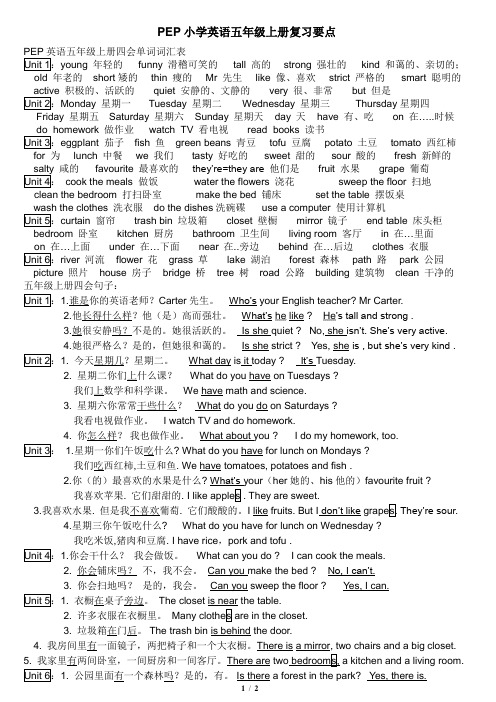
PEP小学英语五年级上册复习要点young 年轻的 funny 滑稽可笑的 tall 高的 strong 强壮的kind 和蔼的、亲切的;short矮的thin 瘦的Mr 先生like 像、喜欢strict 严格的smart 聪明的积极的、活跃的quiet 安静的、文静的very 很、非常but 但是Monday 星期一Tuesday 星期二 Wednesday 星期三 Thursday星期四星期五Saturday 星期六 Sunday 星期天 day 天 have 有、吃 on 在…..时候做作业watch TV 看电视read books 读书eggplant 茄子fish 鱼green beans 青豆tofu 豆腐potato 土豆tomato 西红柿lunch 中餐we 我们tasty 好吃的sweet 甜的sour 酸的fresh 新鲜的咸的favourite 最喜欢的they’re=they are 他们是fruit 水果grape 葡萄cook the meals 做饭water the flowers 浇花sweep the floor 扫地打扫卧室make the bed 铺床set the table 摆饭桌洗衣服do the dishes洗碗碟use a computer 使用计算机curtain 窗帘trash bin 垃圾箱closet 壁橱mirror 镜子end table 床头柜卧室kitchen 厨房bathroom 卫生间living room 客厅in 在…里面…上面under 在…下面near 在..旁边behind 在…后边clothes 衣服river 河流 flower 花 grass 草lake 湖泊forest 森林path 路park 公园照片 house 房子 bridge 桥 tree 树road 公路building 建筑物clean 干净的五年级上册四会句子:1.谁是你的英语老师?Carter先生。
- 1、下载文档前请自行甄别文档内容的完整性,平台不提供额外的编辑、内容补充、找答案等附加服务。
- 2、"仅部分预览"的文档,不可在线预览部分如存在完整性等问题,可反馈申请退款(可完整预览的文档不适用该条件!)。
- 3、如文档侵犯您的权益,请联系客服反馈,我们会尽快为您处理(人工客服工作时间:9:00-18:30)。
1新版PEP五年级上册知识点总结Unit 1 What’s he like?重点单词old 老的,年纪大的young 年轻的funny 滑稽的可笑的kind 体贴的strict 严格的polite 有礼貌的shy 羞怯的,怕生的helpful有用的clever 聪明的,聪颖的hard-working工作努力的,辛勤的music 音乐art 美术science 科学English 英语maths/math 数学Chinese 语文,中文sometimes 有时,间或robot 机器人speak说讲(某种语言)重点句子1. —Who’s your art teacher? 谁是你的美术老师?—Mr. Jones.琼斯老师。
2. —Is he young? 他年轻吗?—Yes, he is. 是的,他年轻。
—No, he isn’t.3. —What’s Wu Yifan like? 吴一帆怎样?—He’s hard-working. 他很勤奋。
4. Ms Wang will be our new Chinese teacher. 王老师会成为我们的新语文老师。
5. He is very helpful at home. 他在家很能干。
6. Robin is short but strong. 罗宾个子矮,但是身体强壮。
7. He can speak Chinese and English. 他会说中文和英语。
8. He makes me finish my homework. 他让我完成我的作业。
语音字母y在单词中的发音:1、双音节或多音节词末发[ i ]。
例:bab y happ y windy sunn y sorr y cand y man y famil y part y 婴儿开心的有风的晴朗的对不起糖果许多家庭聚会课外补充:2、y在单音节词末发[ ai ] 例:b y 乘坐m y 我的wh y 为什么cr y 哭fl y 飞重点知识及语法1、询问他人的外貌或性格:-What’s he/she like? - He/She is kind/…2、一般疑问句的问与答:—Is he/she…?—Yes, he/she is.—No, he/she isn’t.—Do you know…? —Yes, I do.—No, I don’t3、be动词的三种形式am, is, are与人称代词连用的用法:I + am, He, she, it,人名、物名+ is We, you, they + are4、and和but的区别:and “和,与”,表并列关系He is tall and thin. 他又高又瘦。
but “但是”,表转折关系He is short but strong. 他个子矮,但是身体强壮。
Unit 2My week 重点单词Sunday (Sun.) 周日Monday (Mon.) 周一Tuesday(Tue./Tues.)周二Wednesday(Wed./Weds.) 周三Thursday (Thur./Thurs.) 周四Friday (Fri.) 周五Saturday (Sat.) 周六weekend 周末wash my clothes 洗衣服watch TV 看电视do homework 做作业read books 看书play football 踢足球on the weekend 在周末play sports/do sports 做体育运动listen to music 听音乐play ping-pong 打乒乓球重点句子1. —What do you have on Thursday s? 星期四你们上什么课?—I have math, English and music. 我们上数学、英语和音乐课。
2. —What do you do on Thursdays, Grandpa? 爷爷,星期四你要做什么?—I have a cooking class with your grandma. 我和你奶奶去上烹饪课。
3. —Do you often read books in this park? 你经常在这个公园看书吗?—Yes, I do.是的—No, I don’t.不是4. Look at my picture. 看我的图片。
5. You look tired. 你看起来很累。
6. You should play sports every day. 你应该每天做运动。
语音字母组合ee, ea在单词中的的发音:[ i: ]例:f ee t b ee f m ee t s ee f ee d t ea r ea d ea t rep ea t脚牛肉遇见看见喂养茶阅读吃重复注:1、ee组合绝大部分发长音[ i: ],只有少部分发短音[ i ],如:coffee 咖啡2、ea字母组合除了发[ i: ],还有可能发[ e ]等发音,如:bread 面包,或者发[ ei ],如:great 好极了重点知识及语法1、询问做什么事/活动:—What do you do …? —I often play ping-pong…询问星期几上什么课:—What do you have on…? —We have English class…2、一般疑问句的问与答:—Do you often read books? —Yes, I do. —No, I don’t.3、on+具体某一天(年月日,星期),如:on Monday/Tuesday…课外at+具体时刻(…点钟),如:at 12 o’clock 在十二点整补充:in+大致时间(年月,早中晚),如:in 2014 在2014年in the morning/afternoon/evening 4、play + 球类、棋类、娱乐活动,如:play football/ping-pongUnit 3What would you like?重点单词ice cream 冰淇淋hamburger 汉堡包tea 茶sandwich 三文治salad 沙拉fresh 新鲜的healthy 健康的delicious 美味的;hot 辣的;辛辣的sweet 含糖的;甜的hungry 饿的thirsty 渴的;口渴的favourite 特别喜爱的food 食物drink 喝;饮carrot 胡萝卜chicken 鸡肉onion 洋葱milk 牛奶bread 面包beef noodles 牛肉面fish sandwich 鱼肉三明治tomato soup 西红柿汤重点句子1.—What would you like to eat? 你想吃什么?—A sandwich, please. 请给我一个三明治。
—What would you like to drink? 你想喝什么?—I’d like some water. 我想喝点水。
2. —What’s your favourite food?你最喜欢吃什么食物?—Noodles. They are delicious.面条。
面条很好吃。
3. My/His /Her favourite food is fish. 我/他/她最喜欢的食物是鱼。
4. I’m hungry/thirsty. 我饿/渴了。
5. I don’t like beef but chicken is OK. 我不喜欢牛肉但是鸡肉也可以。
6. Onions are my favourite vegetable. 洋葱是我最喜欢的蔬菜。
7. I like vegetables but not carrots. 我喜欢吃蔬菜但不喜欢胡萝卜。
语音字母组合ow在单词中的发音:[ au ]例:[ au ] c ow奶牛fl ow er 花w ow哇d ow n 向下h ow如何,怎样n ow现在 sl ow慢的sn ow雪yell ow黄色wind ow窗户sn ow y 下雪的tomorr ow明天重点知识及语法1、询问想要吃/喝什么:—What would you like to eat/drink? —I’d like…2、询问最喜欢的事物:—What’s your favourite food/vegetable/…? —My favourite food/…is…/I like…3、名词复数的规则变化:(1)直接加s;(2)以s, x, sh, ch结尾的,加es,如,bus es box es sandwich es(3)以o结尾,有生命的加es,如,potato es tomato es;无生命的加s,如,photo s piano s zoo s (4)以辅音加y结尾,改y为i再加es,如,famil ies bab ies;以元音加y结尾,直接加s,如,boy s day s(5)以f或fe结尾,改f为v再加es,如knife-kni ves小刀leaf-lea ves树叶4、some+可数/不可数名词例:some apple s(可数)some water/rice/juice/bread/…(不可数)课外补充:不可数名词(词后不可以加-s/es,所接动词用单数is /V-s/es)五年级上册期末复习资料食物food rice bread fruit 肉类meat(肉)fish beef chi ckenpaper(纸)time music weather(天气)rain snow moneyUnit 4 What can you do?重点单词dance 跳舞sing English songs唱英文歌play the pipa 弹琵琶do kung fu 打功夫draw cartoons 画漫画swim 游泳speak English 说英语cook 烹饪,烹调play basketball 打篮球play ping-pong 打兵乓球draw pictures 画画clean the classroom打扫教室重点句子1. We’ll have an English party next Tuesday! 我们下周二将举行英语派对。
2. —What can you do for the party? 你能为派对做些什么呢?—I can sing English songs. 我能唱英文歌。
3. How/What about you? 你呢?4. Can you do any kung fu? 你会打功夫吗—Yes, I can. 是的,我会。
—No, I can’t.5. No problem. I can help you. 没问题。
